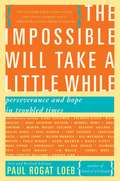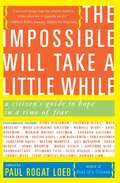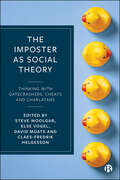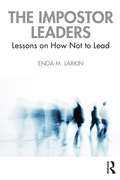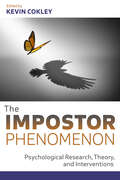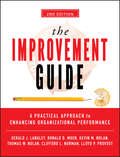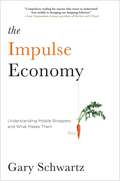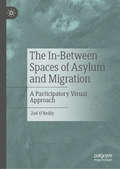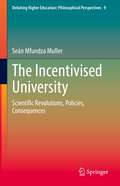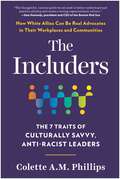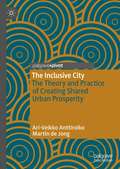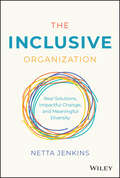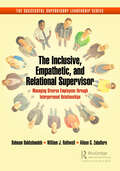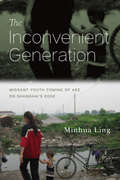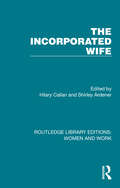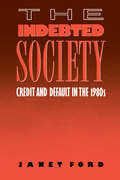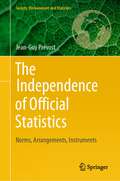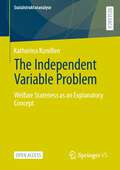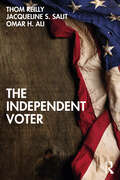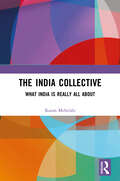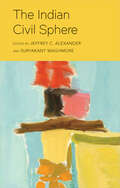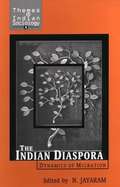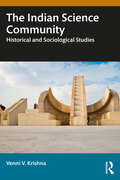- Table View
- List View
The Impossible Will Take A Little While: Perseverance And Hope In Troubled Times
by Paul LoebWhat keeps us going when times get tough? How have the leaders and unsung heroes of world-changing political movements persevered in the face of cynicism, fear, and seemingly overwhelming odds? In The Impossible Will Take a Little While, they answer these questions in their own words, creating a conversation among some of the most visionary and eloquent voices of our times. <P> Ten years after his original edition, Paul Rogat Loeb has comprehensively updated this classic work on what it's like to go up against Goliath--whether South African apartheid, Mississippi segregation, Middle East dictatorships, or the corporations driving global climate change. Without sugarcoating the obstacles, these stories inspire the hope to keep moving forward. <P> Think of this book as a conversation among some of the most visionary and eloquent voices of our times--or any time. Contributors include Maya Angelou, Diane Ackerman, Marian Wright Edelman, Wael Ghonim, Václav Havel, Paul Hawken, Seamus Heaney, Jonathan Kozol, Tony Kushner, Audre Lorde, Nelson Mandela, Bill McKibben, Bill Moyers, Pablo Neruda, Mary Pipher, Arundhati Roy, Dan Savage, Desmond Tutu, Alice Walker, Cornel West, Terry Tempest Williams, and Howard Zinn
The Impossible Will Take a Little While: A Citizen's Guide to Hope in a Time of Fear
by Paul Rogat LoebIn The Impossible Will Take a Little While, a phrase borrowed from Billie Holliday, the editor of Soul of a Citizen brings together fifty stories and essays that range across nations, eras, wars, and political movements. Danusha Goska, an Indiana activist with a paralyzing physical disability, writes about overcoming political immobilization, drawing on her history with the Peace Corps and Mother Teresa. Vaclav Havel, the former president of the Czech Republic, finds value in seemingly doomed or futile actions taken by oppressed peoples. Rosemarie Freeney Harding recalls the music that sustained the civil rights movement, and Paxus Calta-Star recounts the powerful vignette of an 18-year-old who launched the overthrow of Bulgaria's dictatorship. Many of the essays are new, others classic works that continue to inspire. Together, these writers explore a path of heartfelt community involvement that leads beyond despair to compassion and hope. The voices collected in The Impossible Will Take a Little While will help keep us all working for a better world despite the obstacles.
The Imposter as Social Theory: Thinking with Gatecrashers, Cheats and Charlatans
by Steve Woolgar, Else Vogel, David Moats and Claes-Fredrik HelgessonThe figure of the imposter can stir complicated emotions, from intrigue to suspicion and fear. But what insights can these troublesome figures provide into the social relations and cultural forms from which they emerge? Edited by leading scholars in the field, this volume explores the question through a diverse range of empirical cases, including magicians, spirit possession, fake Instagram followers, fake art and fraudulent scientists. Proposing ‘thinking with imposters’ as a valuable new tool of analysis in the social sciences and humanities, this revolutionary book shows how the figure of the imposter can help upend social theory.
The Impostor Leaders: Lessons on How Not to Lead
by Enda M. LarkinTaking a novel approach to the subject of leadership, this book uses its dark side as a vehicle to highlight some important leadership lessons, helping all managers to reflect on their own performance. The Impostor Leaders clarifies what is meant by genuine leadership, focusing on the fact that leading and managing go hand in hand. Based on this ability to consistently combine the leadership and management roles, this book describes in detail and practical terms, using real-world examples, the range of good and bad leader-types seen in organizations today. The Leadership Wheel is also introduced as a conceptual framework to isolate eight types of leaders across four categories. Appealing to leaders and managers across industry sectors, this book’s substantial analysis of bad leadership gives readers a tangible framework against which to consider their own capabilities.
The Impostor Phenomenon: Psychological Research, Theory, and Interventions
by Kevin CokleyThis book offers a scientific investigation into the impostor phenomenon, a concept that has long been misunderstood in popular culture. Much of the conventional wisdom about the impostor phenomenon is driven by intuitive, common-sense based recommendations about how to cope with and conquer impostor feelings. Unfortunately, much of this discourse is neither rooted in nor informed by empirical research. There are many important theoretical and methodological questions regarding the impostor phenomenon that remain unanswered, such as whether the impostor phenomenon is a personality trait at the core of one's identity, or merely a predisposition triggered by circumstances or fears of being evaluated. This book describes the theoretical underpinnings of the impostor phenomenon along with common measurement issues, implications for mental health and achievement, its relative prevalence among various population groups, and practical applications of the concept in psychotherapy and mental health treatment more broadly.
The Impostor Phenomenon: Psychological Research, Theory, and Interventions
by Kevin CokleyThis book offers a scientific investigation into the impostor phenomenon, a concept that has long been misunderstood in popular culture. Much of the conventional wisdom about the impostor phenomenon is driven by intuitive, common-sense based recommendations about how to cope with and conquer impostor feelings. Unfortunately, much of this discourse is neither rooted in nor informed by empirical research. There are many important theoretical and methodological questions regarding the impostor phenomenon that remain unanswered, such as whether the impostor phenomenon is a personality trait at the core of one's identity, or merely a predisposition triggered by circumstances or fears of being evaluated. This book describes the theoretical underpinnings of the impostor phenomenon along with common measurement issues, implications for mental health and achievement, its relative prevalence among various population groups, and practical applications of the concept in psychotherapy and mental health treatment more broadly.
The Improvement Guide
by Thomas W. Nolan Kevin M. Nolan Gerald J. Langley Lloyd P. Provost Ronald Moen Clifford L. NormanThis new edition of this bestselling guide offers an integrated approach to process improvement that delivers quick and substantial results in quality and productivity in diverse settings. The authors explore their Model for Improvement that worked with international improvement efforts at multinational companies as well as in different industries such as healthcare and public agencies. This edition includes new information that shows how to accelerate improvement by spreading changes across multiple sites. The book presents a practical tool kit of ideas, examples, and applications.
The Impulse Economy
by Gary SchwartzWe live in a world where our mobile devices have become extensions of ourselves. We depend on them for instant connections to entertainment, social media, news, and deals. The phone has become our ticket, loyalty card, and catchall wallet.Networks are faster, phones are smarter, and the mobile shopper is ready to spend money now. What can a business do to maximize the mobile buying power of the new impulse consumer? Gary Schwartz has written a groundbreaking book that outlines the history of the mobile industry and shows just how businesses can build up their mobile platforms to maximize online sales. He'll explain:* How to minimize barriers between the shopper and a sale.* How marketers can connect and, more important, reconnect with loyal shoppers.* The technology available now--and what's coming soon--and how to pick a solution that will deliver results.But like Blink or Freakonomics, this isn't just a book for businesses. It's also an eye-opening look into the ways our economy is changing every second of every day. Gary Schwartz analyzes a phenomenon that's modifying people's actions and challenges our assumptions about our behavior as consumers. Anyone interested in the ways our behavior as shoppers is changing--and what we can do to better harness this opportunity--will find this book to be essential reading.
The Impulse Economy: Understanding Mobile Shoppers and What Makes Them Buy
by Gary SchwartzWe live in a world where our mobile devices have become extensions of ourselves. We depend on them for instant connections to entertainment, social media, news, and deals. The phone has become our ticket, loyalty card, and catchall wallet.Networks are faster, phones are smarter, and the mobile shopper is ready to spend money now. What can a business do to maximize the mobile buying power of the new impulse consumer? Gary Schwartz has written a groundbreaking book that outlines the history of the mobile industry and shows just how businesses can build up their mobile platforms to maximize online sales. He'll explain:* How to minimize barriers between the shopper and a sale.* How marketers can connect and, more important, reconnect with loyal shoppers.* The technology available now--and what's coming soon--and how to pick a solution that will deliver results.But like Blink or Freakonomics, this isn't just a book for businesses. It's also an eye-opening look into the ways our economy is changing every second of every day. Gary Schwartz analyzes a phenomenon that's modifying people's actions and challenges our assumptions about our behavior as consumers. Anyone interested in the ways our behavior as shoppers is changing--and what we can do to better harness this opportunity--will find this book to be essential reading.
The In-Between Spaces of Asylum and Migration: A Participatory Visual Approach
by Zoë O’ReillyBased on ethnographic research with asylum seekers living in a ‘direct provision’ centre in Ireland, and comprising participatory visual methods, this work offers a unique examination of the ‘direct provision’ system that analyses the tensions between exclusion and marginalization, and involvement and engagement with local communities. It gives voice to the perspectives of residents themselves through an analysis of photographic images and texts created by the participants of the project, providing fresh insight into the everyday experiences of living in these liminal zones between borders, and the various forms of attachment, engagement and belonging that they create. While the book’s empirical focus is on the Irish context, the analysis sheds light on broader policies and experiences of exclusion and the increasing number of liminal spaces between and within borders in which people seeking protection wait. Situated at the intersection of social anthropology, human geography and participatory arts and visual culture, it will appeal to scholars and students focusing on migration and asylum, ethnicity and integration, as well as those with an interest in participatory and visual research methods.
The Incentivised University: Scientific Revolutions, Policies, Consequences (Debating Higher Education: Philosophical Perspectives #9)
by Seán Mfundza MullerThe core thesis of this book is that to understand the implications of incentive structures in modern higher education, we require a deeper understanding of associated issues in the philosophy of science. Significant public and philanthropic resources are directed towards various forms of research in the hope of addressing key societal problems. That view, and the associated allocation of resources, relies on the assumption that academic research will tend towards finding truth – or at least selecting the best approximations of it. The present book builds on, and extends, contributions in philosophy and higher education to argue that this assumption is misplaced: with serious implications for modern higher education and its role in informing societal decisions and government policy. The book develops a philosophical foundation for the analysis of the connection between higher education incentives, scientific progress and societal outcomes. That in turn is used to demonstrate how the current approach to incentivising intellectual and scientific progress is likely not only to fail, but in fact to cause harm on the very dimensions it purports to improve. The arguments presented are illustrated with examples from medicine and academic economics, making the book one of the first to examine issues of scientific progress and social consequences across the human and social sciences. In doing so, it develops a novel critique of modern economics that in turn provides a more philosophically substantive foundation for popular critiques of economics than has existed to date.
The Includers: The 7 Traits of Culturally Savvy, Anti-Racist Leaders
by Colette A.M. PhillipsLearn to be a leader who is not simply &“against racism,&” but who actively advocates for diversity, equity, and inclusion as an anti-racist ally. It&’s a simple fact that the people who make policy and oversee government, sports, business, and the arts and entertainment are most commonly white men. Another fact: We cannot achieve meaningful progress if we exclude the very people who have the power to make systemic change. This easy-to-read handbook is free of any attempts to shame, blame, or guilt leaders for the choices they made in the past or privileges they were born with. Instead, readers will learn to view the work they do through a racial equity lens so they can easily and immediately begin making changes. In The Includers, Colette Phillips explores the core qualities that inclusive leaders share: character, cultural intelligence, connections, communications, collaboration, courage, and commitment. With humor and poignance, and backed by research, Phillips shares stories of real Includers: the CEOs, politicians, and public figures—all white male allies—she&’s admired, known, and, in some cases, counseled. For leaders who are ready to do their part and get beyond today&’s &“anti-woke&” rhetoric, this eye-opening guide demonstrates the business imperative of diversity, equity, and inclusion and offers practical, actionable insights from allies and advocates who are willing to listen, learn, and &“lead from behind&” to create sustainable systemic change.
The Inclusive City: The Theory and Practice of Creating Shared Urban Prosperity
by Ari-Veikko Anttiroiko Martin de JongThis book provides a conceptual framework for understanding the inclusive city. It clarifies the concept, dimensions and tensions of social and economic inclusion and outlines different forms of exclusion to which inclusion may be an antidote. The authors argue that as inclusion involves a range of inter-group and intragroup tensions, the unifying role of local government is crucial in making inclusion a reality for all, as is also the adoption of an inclusive and collaborative governance style. The book emphasizes the need to shift from citizens’ rights to value creation, thus building a connection with urban economic development. It demonstrates that inclusion is an opportunity to widen the local resource base, create collaborative synergies, and improve conditions for entrepreneurship, which are conducive to the creation of shared urban prosperity.
The Inclusive Organization: Real Solutions, Impactful Change, and Meaningful Diversity
by Netta Jenkins"Netta's practical blueprint for how to implement DEI into an organization will be transformational to leaders and employees alike."—Marc Lore, Former CEO of Walmart; NBA Owner, Minnesota Timberwolves; Founder of Telosa A practical hands-on and revolutionary DEI formula for real and lasting change. DEI is an 8-billion dollar industry that is not yet accessing its full potential through real solutions and results. However, through a powerful formula of policies and practices that motivate employees to be more socially and self-aware, The Inclusive Organization is a revolutionary yet practical resource for individuals at any stage of their career. Jenkins discusses human behavior, workplace psychology, and shares her DEI-tested framework for success. You'll read about: The "how" of DEI implementation with actionable steps Creating your own customized DEI roadmap with worksheet examples and toolkits Stories and firsthand observations that bring to life important concepts Many employees across all levels and organizations are looking to drive actionable impact, but unfortunately lack the knowledge and support in doing so. This book will help any organization improve their DEI initiatives and create the sustainable and scalable change employees want to see within their workplace. Readers will be able to utilize worksheet examples and toolkits out of this book to build their own DEI roadmap. The Inclusive Organization is a must-read for any workplace committed to real and lasting change.
The Inclusive, Empathetic, and Relational Supervisor: Managing Diverse Employees through Interpersonal Relationships (Successful Supervisory Leadership)
by William J. Rothwell Aileen G. Zaballero Behnam BakhshandehSupervisors are the bridge between line employees and middle/upper management. Therefore, they must effectively communicate across the organization to be responsive and thoughtful leaders. With work being more global, organizations are taking advantage of remote work, and the workforce is now more diverse and decentralized, making the workplace more dynamic and complex. However, diversity can be one of the most controversial and least understood business topics because of the issues regarding quality, leadership, and ethics (Anand & Winters, 2008).An inclusive supervisor will ensure that their direct reports are treated fairly and respectfully but never made to feel less than anyone else. They will be a critical success factor in supporting the business case for diversity, equity, inclusion, and belonging (DEI&B) as a critical strategy in a globally competitive market.This book builds on the belief that people are the most valuable resource and that everyone should be treated with dignity and respect. The authors will provide tools to self-assess intrapersonal/interpersonal communication, develop a positive work environment, and evaluate listening skills.A list of competencies to be an effective communicator will be provided. Key concepts such as cross-cultural competence, generational cohort, critical race theory, emotional intelligence, emotional contagion, social exchange theory, and interpersonal competency will be explored.This book provides strategies for building solid relationships with team members; uses positivity as a foundational practice to lead and encourage other employees; provides guidelines on how to hold employees accountable and set high expectations; presents strategies to engage, coach, and develop employees by creating a positive environment to influence attitudes and behaviors; and offers various approaches for managing time and increasing productivity.
The Inconvenient Generation: Migrant Youth Coming of Age on Shanghai's Edge
by Minhua LingAfter three decades of massive rural-to-urban migration in China, a burgeoning population of over 35 million second-generation migrants living in its cities poses a challenge to socialist modes of population management and urban governance. In The Inconvenient Generation, Minhua Ling offers the first longitudinal study of these migrant youth from middle school to the labor market in the years after the Shanghai municipal government partially opened its public school system to them. Drawing on multi-sited ethnographic data, Ling follows the trajectories of dozens of children coming of age at a time of competing economic and social imperatives, and its everyday ramifications on their sense of identity, educational outcomes, and citizenship claims. Under policies and practices of segmented inclusion, they are inevitably funneled through the school system toward a life of manual labor. Illuminating the aspirations and strategies of these young men and women, Ling captures their experiences against the backdrop of a reemergent global Shanghai.
The Incorporated Wife (Routledge Library Editions: Women and Work)
by Callan Hilary Ardener ShirleyOriginally published in 1984, this book touches the private lives and professional responsibilities of men and women, as it illustrates the comic as well as serious effects of the ‘incorporation’ of wives into some important State and commercial institutions. Beyond their domestic functions, wives have, in particular ways, been valuable props to many a husband’s career and many an employer’s and the nation’s interests. For example, the Army, civil administrations at home and overseas, and the police have, without questioning, depended on the services of wives – given silently, willingly or unwillingly. Yet the nature of the relationship of these ‘incorporated’ wives to the objectives of such institutions has, until recently, been largely unregistered in practice, unrecorded in social and historical accounts and unstudied by analysts. This book provides a wealth of ethnographic material. Personal anecdotes and scholarly interpretations throw light on the conceptual systems underlying the workings and cultures of institutions, as well as the construction of identities. Many will find their experiences echoed here. The issues raised are important not only for individual men and women, for whom such ‘incorporation’ may provide advantages as well as constraints, but because of the bearing they have on our understanding of marriage, especially since we cannot be sure this will continue in its present mode or as the dominant form of conjugal union. As more married women assume greater responsibilities at work, will their husbands give the same support to their wives and those who employ them as they themselves received? Further, it seems likely that wives may become less willing than in the past to render their services unacknowledged – indeed this trend is already apparent. We may ask, then, ‘who will fill the gaps?’, and ‘how will institutions change?’. The historical and contemporary studies here provide some base data and some theoretical approaches necessary for any who may wish to consider what will become increasingly acute practical questions.
The Indebted Society: Credit and Default in the 1980s
by Janet FordThis book is about debt - a situation which affects a large and growing number of people. In Britain alone in 1986 more than 2 million people were sued for debt in the county courts. But debt cannot be understood apart from credit, and the 1980s have seen a substantial increase in the amount of credit available. In The Indebted Society Janet Ford gives both an overview of the contemporary credit and debt society and a discussion of the borrower's experience and management of debt. As well as providing a critical examination of the growth and changing structure of credit provision, describing the social and economic base for such growth, and considering explanations for the emergence of default and contemporary attitudes to debt, she also presents a detailed study of forty households with mortgage arrears, placing these personal histories within the broader structure of a credit and debt society.
The Independence of Official Statistics: Norms, Arrangements, Instruments (Society, Environment and Statistics)
by Jean-Guy PrévostThis book explores the independence of official statistics and describes the various legal and professional norms, institutional arrangements, instruments and practices that statisticians have developed over recent decades to protect their work from political interference. It argues that this ‘drive for independence’, which saw the replication of these norms, arrangements, and instruments across countries, was largely led by the international epistemic community of statisticians, and it identifies some of the paths and processes that enabled this drive.The study conducts an overall, multi-dimensional, and detailed comparative examination of the thirty-eight OECD countries’ norms, arrangements, and practices regarding the institutional and professional independence of official statistics. For that purpose, several dimensions have been surveyed and an index has been built that allows patterns and clusters to be uncovered among the OECD countries, shedding light on the variations that can be observed from one subgroup of countries to another.The issue of the independence of official statistics has been at the heart of several recent statistical controversies, including that of Greece’s debt, censuses in Canada and the United States, the Argentinian cost of living index, and some recent cases of resignation or dismissal of senior statisticians in various countries. Such independence has been a major topic of discussion in the epistemic community since the turn of the century, and concerns have also been addressed more widely, in the media. The subject of the book is particularly relevant as official statistics also play a significant role in monitoring the progress of the United Nations’ Sustainable Development Goals. This book will appeal to anyone interested in the topic of official statistics and to students of government in general.
The Independent Variable Problem: Welfare Stateness as an Explanatory Concept (Sozialstrukturanalyse)
by Katharina KunißenThis open access publication deals with the operationalisation of the welfare state as an independent variable.To study how welfare states affect social inequality, individual behaviour, attitudes and more in different countries, an empirical operationalisation of the welfare state or specific elements of social policy is required. However, this operationalisation is fraught with some important problems. These problems essentially relate to one point: while there are a large number of contributions dealing with the measurement of differences between welfare states per se and as a dependent variable, there is a lack of feasible recommendations for a standardised operationalisation of welfare stateness as an independent variable.So far, there has been no systematic investigation of how such different approaches may affect the results and their comparability. Also missing is an in-depth conceptual discussion of which features of the welfare state are particularly relevant for explaining certain effects.This book fills both gaps. First, it exposes the pitfalls of existing approaches and shows how much empirical results can vary depending on the operationalisation chosen. Second, it proposes a framework for a standardised conceptualisation and operationalisation of social policies as independent variables that constrains operational decisions in a theoretically meaningful way.
The Independent Voter
by Thom Reilly Jacqueline S. Salit Omar H. AliIndependent voters—the 40–50 percent of Americans who reject identification with either of the two major parties or with any party—are increasing in number and impact. Independents are determining the outcome of major elections, upending the long-held categories of political science. Drawing on historical and contemporary data (including survey data, participant observation, interviews, and current writings and scholarship) and providing timely new analysis, the authors argue that independents are an engine for a transformation of US democracy, perhaps even its saviors. Rather than “leaning” to a party or an ideology, independents vary on issues but share a deep distrust of the partisan system. What are the consequences of this distrust? What about shifting trends among Black, Latino, and Asian communities regarding party loyalty? What of young voters who eschew party identification wanting a different kind of political culture? For a wide variety of audiences, this book gives students, scholars, campaign professionals, activists, and media analysts an insight into current voting dynamics and future possibilities.
The India Collective: What India is Really All About
by Karan MehrishiProsperous countries have a socio-economic operating system, which India lacks. This book argues that India must incorporate a structure aligned with its collective identity to compete globally for wealth creation. The book, divided into three epochs—Past, Present, and Future—offers a comprehensive understanding of India as a country, economy, and value system.Print edition not for sale in South Asia (India, Sri Lanka, Nepal, Bangladesh, Pakistan and Bhutan)
The Indian Civil Sphere
by Jeffrey C. Alexander Suryakant WaghmoreIndian democracy is in trouble. A still widely popular, democratically elected leader stands athwart it, dangerously authoritarian and disrespectful of civil liberties, the independence of the courts and the press, and disputatious vis-à-vis organized counter-powers. Leading intellectuals, Indian and Western, write about the death of Indian democracy and the passage to despotism. Despite these clear and present dangers, this volume suggests that the death of Indian democracy has been greatly exaggerated. To understand why, we must move beyond democracy narrowly understood as a governmental form to a broader theory of the cultural, associational, and institutional life necessary to sustain it. Building on the insights of civil sphere theory, this volume presents a complex understanding of the progress, reaction, and upheaval that has buffeted independent India. The vitality of India’s civil sphere nourished vast waves of anti-caste movements that energized Indian politics, creating civil repairs that brought it closer to its founding promise to become a less hierarchical society. Yet, the very success of these progressive movements triggered tsunamis of backlash reaction – Hindu revivalism, Muslim exclusion, horrific outbreaks of communal violence. Narendra Modi and the BJP rode these reactionary waves to power, but, as the 2024 election demonstrated, it is a power still hedged in by the continued vitality of India’s civil sphere. Despite pressures from big business and big government, print and digital media continue to broadcast powerful critical interpretations, speaking truth to power at critical junctures. The Indian legal order, despite enormous problems, continues to protect speech, association, the right to vote and the right to have those votes counted accurately. A powerful demonstration of both the richness of civil sphere theory and the vitality of Indian democracy, The Indian Civil Sphere will be of interest to students and scholars in sociology, politics and Asian studies and to anyone interested in the politics of the world’s largest democracy.
The Indian Diaspora
by Narayana Jayaram`Jayaram provides a well-presented overview of the patterns of emigration from India, highlighting the key disciplinary perspectives and strategic approaches.... The papers provide a very valuable contribution to the literature on the Indian diaspora and are a useful addition to one's collection' - The Journal of the Royal Anthropolgical Institute The study of Indian diaspora has emerged as a rich and variegated area of multidisciplinary research interest. This volume brings together nine seminal articles by well-known scholars which deal with the empirical reality of Indian diaspora and the theoretical and methodological issues raised by it. Between them they cover a variety of important aspects such as asocial adjustment, family change, religion, language, ethnicity and culture.
The Indian Science Community: Historical and Sociological Studies
by Venni V. KrishnaThis book focuses on the historical and sociological dimensions of scientists working in laboratories in India, offering insights into the historical, sociological and policy factors that shape scientific pursuits. It illuminates the challenges, accomplishments and the evolving role of science in societal development.The author initiates a broader discourse on the interplay between scientific advancements, societal contexts and policy frameworks. The book fosters a deeper understanding of science's role in shaping India’s social fabric and contributing to the global scientific dialogue. It also explores issues such as brain drain, science activism and the conflict between university- and government-run models of science.Lucid and topical, the book will be of considerable interest to both social and natural scientists, as well as the general academic community, including research students in science, technology, history, social history of science, science and technology studies and innovation policies.
